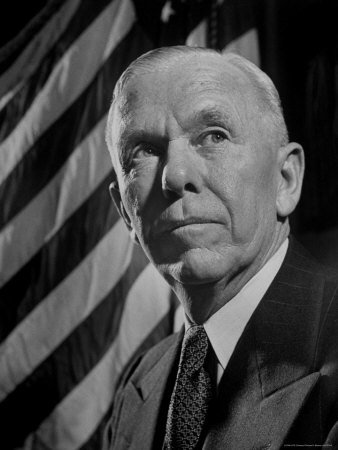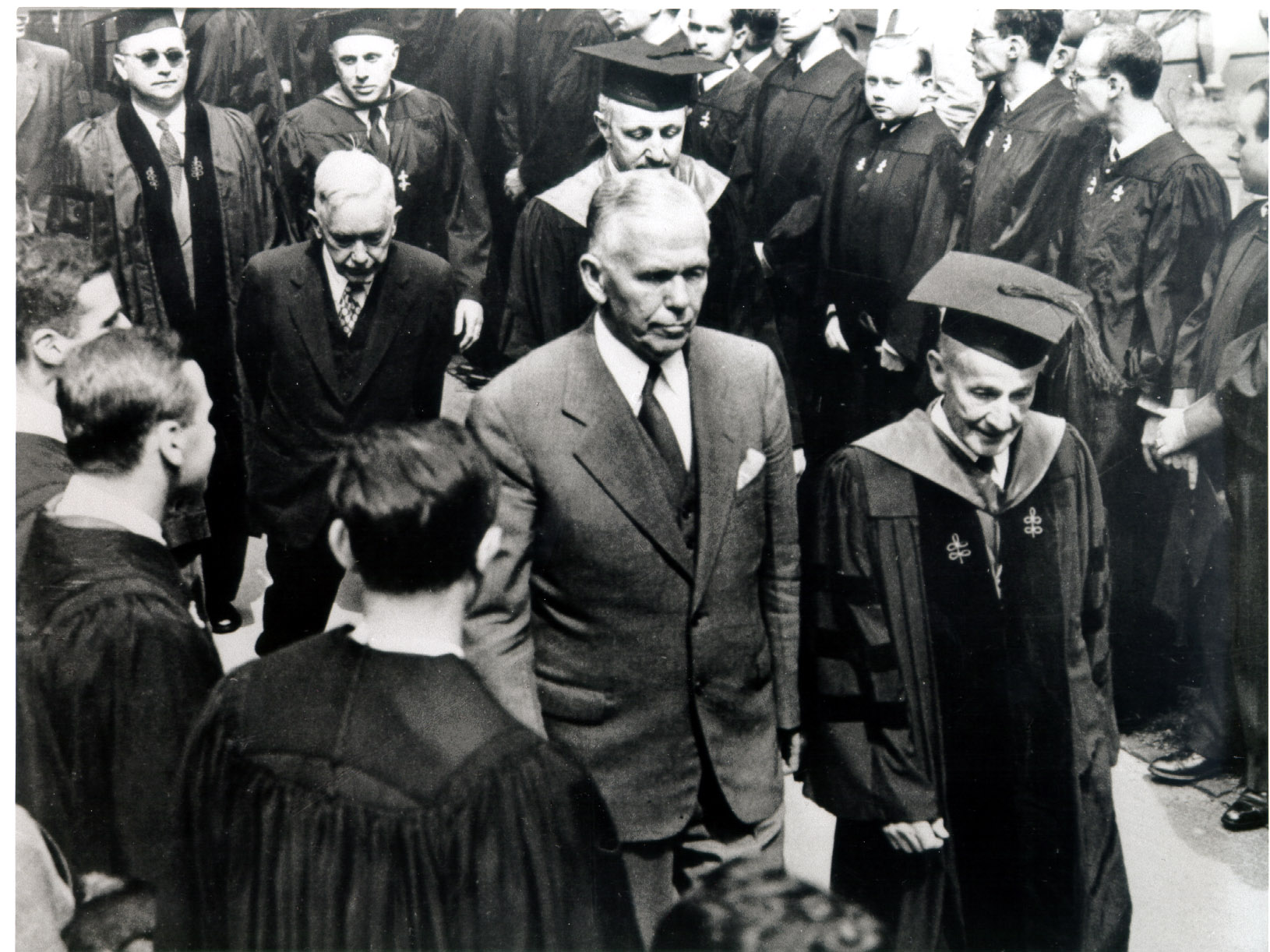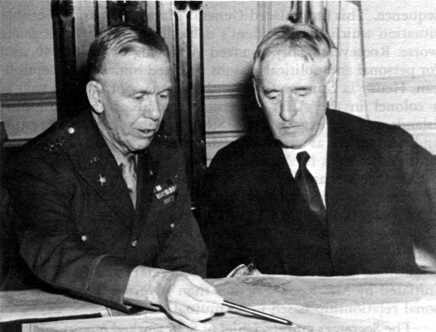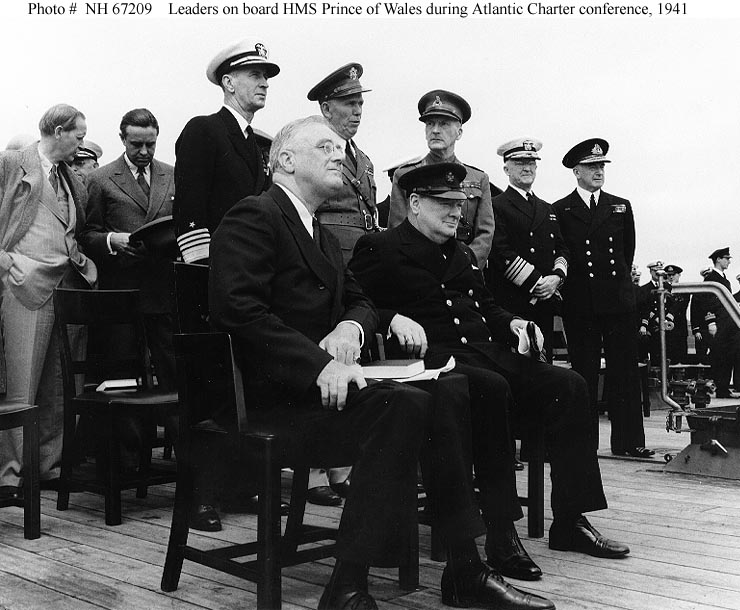<Back to Index>
- Explorer Jacques Cartier, 1491
- Painter Henri Émile Benoit Matisse, 1869
- U.S. Secretary of State General George Catlett Marshall, 1880
PAGE SPONSOR

General of the Army George Catlett Marshall (December 31, 1880 – October 16, 1959) was an American military leader, Chief of Staff of the Army, Secretary of State, and the third Secretary of Defense. Once noted as the "organizer of victory" by Winston Churchill for his leadership of the Allied victory in World War II, Marshall served as the U.S. Army Chief of Staff during the war and as the chief military adviser to President Franklin D. Roosevelt. As Secretary of State his name was given to the Marshall Plan, for which he was awarded the Nobel Peace Prize in 1953.
George C. Marshall was born into a middle-class family in Uniontown, Pennsylvania, the son of George C. Marshall, Sr. and Laura Bradford Marshall. Marshall was a scion of an old Virginia family, as well as a distant relative of former Chief Justice John Marshall. Marshall graduated from the Virginia Military Institute (VMI), where he was initiated into the Kappa Alpha Order, in 1901. Following graduation from VMI, Marshall was commissioned a Second Lieutenant in the U.S. Army. Until World War I, he was posted to various positions in the US and the Philippines, and was trained in modern warfare. During the war, he had roles as a planner of both training and operations. He went to France in mid-1917 as the director of training and planning for the 1st Infantry Division. In mid-1918, he was promoted to American Expeditionary Forces headquarters, where he worked closely with his mentor General John J. Pershing and was a key planner of American operations. He was instrumental in the design and coordination of the Meuse-Argonne offensive, which contributed to the defeat of the German Army on the Western Front.
In 1919, he became an aide-de-camp to General John J. Pershing. Between 1920 and 1924, while Pershing was Army Chief of Staff, Marshall worked in a number of positions in the US Army, focusing on training and teaching modern, mechanized warfare. Between World Wars I and II, he was a key planner and writer in the War Department, spent three years in China, and taught at the Army War College. From June 1932 to June 1933 he was the Commanding Officer at Fort Screven, Savannah Beach, Georgia, now named Tybee Island. In 1934, Col. Marshall put Edwin F. Harding in charge of the Infantry School's publications, and Harding became editor of Infantry in Battle, a book that codified the lessons of World War I. Infantry in Battle is still used as an officer's training manual in the Infantry Officer's Course, and was the training manual for most of the infantry officers and leaders of World War II.
Marshall was promoted to Brigadier General in October 1936. He commanded the Vancouver Barracks in Vancouver, Washington, from 1936 - 1938. Nominated by President Franklin Roosevelt to be Army Chief of Staff, Marshall was promoted to full General and sworn in on September 1, 1939, the day German forces invaded Poland, which began World War II. He would hold this post until the end of the war in 1945.
As Chief of Staff, Marshall organized the largest military expansion in U.S. history, inheriting an outmoded, poorly-equipped army of 189,000 men and, partly drawing from his experience teaching and developing techniques of modern warfare as an instructor at the Army War College, coordinated the large-scale expansion and modernization of the U.S. Army. Though he had never actually led troops in combat, Marshall was a skilled organizer with a talent for inspiring other officers. Many of the American generals who were given top commands during the war were either picked or recommended by Marshall, including Dwight Eisenhower, Lloyd Fredendall, Leslie McNair, Mark Wayne Clark and Omar Bradley. Faced with the necessity of turning an army of former civilians into a force of over eight million soldiers by 1942 (a fortyfold increase within three years), Marshall directed General Leslie McNair to focus efforts on rapidly producing large numbers of soldiers. With the exception of airborne forces, Marshall approved McNair's concept of an abbreviated training schedule for men entering Army land forces training, particularly in regards to basic infantry skills, weapons proficiency, and combat tactics. At the time, most U.S. commanders at lower levels had little or no combat experience of any kind; without the input of experienced British or Allied combat officers on the nature of modern warfare and enemy tactics, many of them resorted to formulaic training methods emphasizing static defense and orderly large-scale advances by motorized convoys over improved roads. In consequence, Army forces deploying to Africa suffered serious initial reverses when encountering German armored combat units in Africa at Kasserine Pass and other major battles. Even as late as 1944, U.S. soldiers undergoing stateside training in preparation for deployment against German forces in Europe were not being trained in combat procedures and tactics currently being employed there.
Originally, Marshall had planned a 200-division Army with a system of unit rotation such as practiced by the British and other Allies. By mid-1943, however, after pressure from government and business leaders to preserve manpower for industry and agriculture, he had abandoned this plan in favor of a 90-division Army using individual replacements sent via a circuitous process from training to divisions in combat. The individual replacement system (IRS) devised by Marshall and implemented by McNair greatly exacerbated problems with unit cohesion and effective transfer of combat experience to newly-trained soldiers and officers. In Europe, where there were few pauses in combat with German forces, the individual replacement system had broken down completely by late 1944. Hastily-trained replacements or service personnel re-assigned as infantry were given six weeks' refresher training and thrown into battle with Army divisions locked in front-line combat. The new men were often not even proficient in the use of their own rifle or weapons system, and once in combat, could not receive enough practical instruction from veterans before being killed or wounded, usually within the first three or four days. Under such conditions, many replacements suffered a crippling loss of morale, while veteran soldiers were kept in line units until they were killed, wounded, or incapacitated by battle fatigue or physical illness. Incidents of soldiers AWOL from combat duty as well as battle fatigue and self-inflicted injury rose rapidly during the last eight months of the war with Germany. As one historian later concluded, "Had the Germans been given a free hand to devise a replacement system ..., one that would do the Americans the most harm and the least good, they could not have done a better job."
Marshall's
abilities to pick competent field commanders during the early part of
the war was decidedly mixed. While he had been instrumental in
advancing the career of the able Dwight D. Eisenhower, he had also
recommended the swaggering Lloyd Fredendall to Eisenhower for a major command in the American invasion of North Africa during Operation Torch.
Marshall was especially fond of Fredendall, describing him as "one of
the best" and remarking in a staff meeting when his name was mentioned,
"I like that man; you can see determination all over his face."
Eisenhower duly picked him to command the 39,000-man Central Task Force
(the largest of three) in Operation Torch. Both men would later come to regret that decision after the U.S. Army debacle at Kasserine Pass. During World War II, Marshall was instrumental in preparing the U.S. Army and Army Air Forces for
the invasion of the European continent. Marshall wrote the document
that would become the central strategy for all Allied operations in
Europe. He initially scheduled Operation Overlord for 1 April 1943, but met with strong opposition from Winston Churchill, who convinced Roosevelt to commit troops to Operation Husky for
the invasion of Italy. Some authors think that WWII could have been
terminated one year earlier if Marshall had had his way, others think
that such invasion would have meant utter failure. But it is true that
the German Army in 1943 was overstretched and defense works in Normandy
were not ready. It was assumed that Marshall would become the Supreme Commander of Operation Overlord, but Roosevelt selected Dwight Eisenhower as Supreme Commander. While Marshall enjoyed considerable success in working with Congress and President Franklin D. Roosevelt,
he refused to lobby for the position. President Roosevelt didn't want
to lose his presence in the states. He told Marshall, "I didn't feel I
could sleep at ease if you were out of Washington." When
rumors circulated that the top job would go to Marshall, many critics
viewed the transfer as a demotion for Marshall, since he would leave
his position as Chief of Staff of the Army and lose his seat on the Combined Chiefs of Staff. On December 16, 1944, Marshall became the first American general to be promoted to 5 star rank, the newly created General of the Army. He was the second American to be promoted to a 5 star rank, as William Leahy was promoted to fleet admiral the previous day. This position is the American equivalent rank to field marshal. Throughout
the remainder of World War II, Marshall coordinated Allied operations
in Europe and the Pacific. He was characterized as the organizer of
Allied victory by Winston Churchill. Time Magazine named Marshall Man of the Year for
1943. Marshall resigned his post of Chief of Staff in 1945, but did not
retire, as regulations stipulate that Generals of the Army remain on
active duty for life. After
World War II ended, the Congressional Joint Committee on the
Investigation of the Pearl Harbor Attack received testimony on the
intelligence failure. It amassed 25,000 pages of documents, 40 volumes,
and included nine reports and investigations, eight of which had been
previously completed. Among these documents was a report critical of
Marshall for his delay in sending General Walter Short,
the Army commander in Hawaii, important information concerning a
possible attack on December 6 and 7. The report also criticized
Marshall’s admitted lack of knowledge of the readiness of the Hawaiian
Command during November and December 1941. Ten days after the attack
Lt. General Short and Admiral Husband E. Kimmel,
commander of the Navy at Pearl Harbor, were both relieved of their
duties. The final report of the Joint Committee did not single out and
fault Marshall. While the report was critical of the overall situation,
the committee noted that subordinates had failed to pass on important
information to their superiors, including Marshall. The report noted
that once General Marshall received information about the impending
attack, he immediately passed it on. In December 1945, President Harry Truman sent Marshall to China to broker a coalition government between the Nationalist allies under Generalissimo Chiang Kai-shek and Communists under Mao Zedong.
Marshall had no leverage over the Communists, but threatened to
withdraw American aid essential to the Nationalists. Both sides
rejected his proposals and the Chinese Civil War escalated, with the Communists winning in 1949. His mission a failure, he returned to the United States in January 1947. As Secretary of State in 1947-48, Marshall seems to have disagreed with strong opinions in The Pentagon and State department that Chiang's success was vital to American interests, insisting that U.S. troops not become involved. After Marshall's return to the U.S. in early 1947, Truman appointed Marshall Secretary of State. He became the spokesman for the State Department's ambitious plans to rebuild Europe. On June 5, 1947 in a speech at Harvard University, he outlined the American plan. The European Recovery Program, as it was formally known, became known as the Marshall Plan. Clark Clifford had
suggested to Truman that the plan be called the Truman Plan, but Truman
immediately dismissed that idea and insisted that it be called the
Marshall Plan. The Marshall Plan would help Europe quickly rebuild and modernize its economy along American lines. The Soviet Union forbade its satellites to participate. Marshall was again named TIME's Man of the Year for 1947, and received the Nobel Peace Prize for
his post-war work in 1953. He was the only U.S. Army General to have
received this honor. As Secretary of State, Marshall strongly opposed
recognizing the State of Israel,
telling President Truman in May 1948, "If you (recognize the state of
Israel) and if I were to vote in the election, I would vote against
you." Marshall resigned from the State Department because of ill health on January 7, 1949, and the same month became chairman of American Battle Monuments Commission. In September 1949, Marshall was named president of the American National Red Cross. When the early months of the Korean War showed how poorly prepared the Defense Department was, Truman fired Secretary Louis A. Johnson and named Marshall as Secretary of Defense in
September 1950. On September 30, Defense Secretary George Marshall sent
an eyes-only message to MacArthur instructing MacArthur to escalate the
war in Korea "We want you to feel unhampered tactically and
strategically to proceed north of the 38th parallel." His
main role was to restore confidence and rebuild the armed forces from
the post-war state of demobilization. He served in that post for less
than one year, retiring from public office for good in September 1951.
In 1953, he represented America at the coronation of Queen Elizabeth II of the United Kingdom. U.S. Senator Joe McCarthy, whose hearings and black lists later spawned the term McCarthyism, gave a speech titled America's Retreat from Victory: The Story of George Catlett Marshall (1951), in which he argued that General Albert Coady Wedemeyer had
prepared a wise plan that would keep China a valued ally, but that it
had been sabotaged. He concluded that "If Marshall were merely stupid,
the laws of probability would dictate that part of his decisions would
serve this country's interest." He
suggested that Marshall was old and feeble and easily duped but did not
charge Marshall with treason. McCarthy specifically alleged: Marshall died on Friday October 16, 1959. He is buried at Arlington National Cemetery. After
leaving office, in a television interview, Harry Truman was asked who
he thought was the American who made the greatest contribution of the
last thirty years. Without hesitation, Truman picked Marshall, adding
"I don't think in this age in which I have lived, that there has been a
man who has been a greater administrator; a man with a knowledge of
military affairs equal to General Marshall." In
spite of world-wide acclaim, dozens of national and international
awards and honors and the Nobel Peace prize, public opinion became
bitterly divided along party lines on Marshall's record. While
campaigning for president in 1952, Eisenhower denounced the Truman
administration's failures in Korea, campaigned alongside McCarthy, and
refused to defend Marshall's policies. Marshall, who assisted
Eisenhower in his promotions, and stood aside, turning down the
opportunity to command the allied forces to allow Eisenhower to take
that role, was surprised at the lack of a positive statement supporting
him from Eisenhower during the McCarthy hearings.


